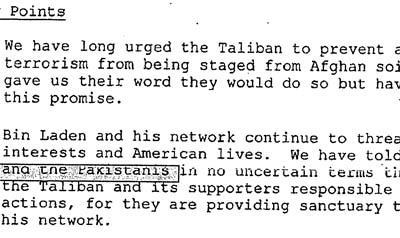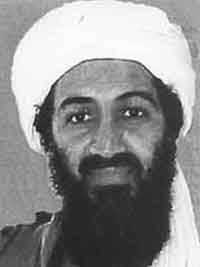US National Security Archive: Osama Bin Laden  Washington, D.C., May 5, 2011 - As the discovery of Osama bin Laden in Abbottabad, Pakistan, raises fresh questions about U.S.-Pakistan relations, newly released documents show that as early as 1998 U.S. officials concluded the Government of Pakistan "is not disposed to be especially helpful on the matter of terrorist Usama bin Ladin." According to previously secret U.S. documents, Pakistani officials repeatedly refused to act on the Bin Laden problem, despite mounting pressure from American authorities. Instead, in the words of a U.S. Embassy cable, Pakistani sources "all took the line that the issue of bin Ladin is a problem the U.S. has with the Taliban, not with Pakistan."
Washington, D.C., May 5, 2011 - As the discovery of Osama bin Laden in Abbottabad, Pakistan, raises fresh questions about U.S.-Pakistan relations, newly released documents show that as early as 1998 U.S. officials concluded the Government of Pakistan "is not disposed to be especially helpful on the matter of terrorist Usama bin Ladin." According to previously secret U.S. documents, Pakistani officials repeatedly refused to act on the Bin Laden problem, despite mounting pressure from American authorities. Instead, in the words of a U.S. Embassy cable, Pakistani sources "all took the line that the issue of bin Ladin is a problem the U.S. has with the Taliban, not with Pakistan."
The documents in this compilation -- part of the National Security Archive's developing Osama Bin Laden File -- were obtained by the Archive through the Freedom of Information Act. They reveal a history of "disappointment that Pakistan ... a good friend of the U.S., was not taking steps to help with Usama bin Ladin (UBL)."
As an ally to both the Taliban and the United States, Pakistan was balancing conflicting policies towards the Bin Laden question. Islamabad continued to support the Taliban regime in Afghanistan, an organization protecting the al-Qaeda leader, while simultaneously promising U.S. leaders it was "taking the bin Laden matter very seriously" and would cooperate with U.S. counterterrorism efforts. Portending momentous events to come, U.S. officials in 1998 lamented that getting Pakistani help in apprehending bin Laden would be "an uphill slog."  | | 1998 State Deparment talking points describe unsuccessful efforts, through Pakistan, to have Bin Laden expelled from Taliban-controlled Afghanistan. | | The Osama Bin Laden File
Pakistan's Bin Laden Policy Declassified Documents Show Pakistani Refusal to Help Apprehend Terrorist before 9/11 National Security Archive Electronic Briefing Book No. 344 Posted - May 5, 2011 For more information contact:
Barbara Elias - 202/994-7000
belias@gwu.edu |
| Related postings The Osama Bin Laden File "No-Go" Tribal Areas Became Basis for Afghan Insurgency Documents Show
Washington's Immediate 9/11 Demands to Islamabad The Taliban Biography: The Structure and Leadership of the Taliban 1996-2002
Documents Show U.S. Officials Worried Mullah Omar Was Growing Closer to Bin Laden in 1998 1998 Missile Strikes on Bin Laden May Have Backfired
Extensive 1999 Report on Al-Qaeda Threat Released by U.S. Dept of Energy Pakistan: "The Taliban's Godfather"?
Documents Detail Years of Pakistani Support for Taliban, Extremists "A Comprehensive Strategy to Fight Al-Qaeda"?
Rice versus Clinton on January 2001 Clarke Memo Bush Administration's First Memo on al-Qaeda Declassified
Document Central to Clarke-Rice Dispute on Bush Terrorism Policy Pre-9/11 Taliban File Update: U.S. Pressed Taliban to Expel Usama bin Laden Over 30 Times
Only three approaches in first year of Bush administration The Hunt for Bin Laden
Background on the role of Special Forces in U.S. military strategy |  | | For more information, see the Archive's Osama Bin Laden File | | Washington, D.C., May 5, 2011 - As the discovery of Osama bin Laden in Abbottabad, Pakistan, raises fresh questions about U.S.-Pakistan relations, newly released documents show that as early as 1998 U.S. officials concluded the Government of Pakistan "is not disposed to be especially helpful on the matter of terrorist Usama bin Ladin." According to previously secret U.S. documents, Pakistani officials repeatedly refused to act on the Bin Laden problem, despite mounting pressure from American authorities. Instead, in the words of a U.S. Embassy cable, Pakistani sources "all took the line that the issue of bin Ladin is a problem the U.S. has with the Taliban, not with Pakistan." The documents in this compilation – part of the National Security Archive's developing Osama Bin Laden File – were obtained by the Archive through the Freedom of Information Act. They reveal a history of "disappointment that Pakistan … a good friend of the U.S., was not taking steps to help with Usama bin Ladin (UBL.)"
As an ally to both the Taliban and the United States, Pakistan was balancing conflicting policies towards the Bin Laden question. Islamabad continued to support the Taliban regime in Afghanistan, an organization protecting the al-Qaeda leader, while simultaneously promising U.S. leaders it was "taking the bin Laden matter very seriously," and would cooperate with U.S. counterterrorism efforts. Portending momentous events to come, U.S. officials in 1998 lamented that getting Pakistani help in apprehending bin Laden would be "an uphill slog."
|




